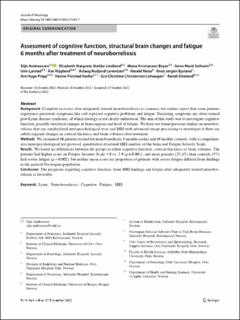Assessment of cognitive function, structural brain changes and fatigue 6 months after treatment of neuroborreliosis
Andreassen, Silje; Lindland, Elisabeth Margrete Stokke; Beyer, Mona K.; Solheim, Anne Marit; Ljøstad, Unn; Mygland, Åse Daasvand; Lorentzen, Åslaug Rudjord; Reiso, Harald; Bjuland, Knut Jørgen; Pripp, Are Hugo; Harbo, Hanne-Cathrin Flinstad; Løhaugen, Gro; Eikeland, Randi
Journal article, Peer reviewed
Published version

Åpne
Permanent lenke
https://hdl.handle.net/11250/3038660Utgivelsesdato
2022Metadata
Vis full innførselSamlinger
- Department of Clinical Medicine [2066]
- Registrations from Cristin [9791]
Sammendrag
Background
Complete recovery after adequately treated neuroborreliosis is common, but studies report that some patients experience persistent symptoms like self-reported cognitive problems and fatigue. Persisting symptoms are often termed post-Lyme disease syndrome, of which etiology is not clearly understood. The aim of this study was to investigate cognitive function, possible structural changes in brain regions and level of fatigue. We have not found previous studies on neuroborreliosis that use standardized neuropsychological tests and MRI with advanced image processing to investigate if there are subtle regional changes in cortical thickness and brain volumes after treatment.
Methods
We examined 68 patients treated for neuroborreliosis 6 months earlier and 66 healthy controls, with a comprehensive neuropsychological test protocol, quantitative structural MRI analysis of the brain and Fatigue Severity Scale.
Results
We found no differences between the groups in either cognitive function, cortical thickness or brain volumes. The patients had higher score on Fatigue Severity Scale 3.8 vs. 2.9 (p = 0.001), and more patients (25.4%) than controls (5%) had severe fatigue (p = 0.002), but neither mean score nor proportion of patients with severe fatigue differed from findings in the general Norwegian population.
Conclusion
The prognosis regarding cognitive function, brain MRI findings and fatigue after adequately treated neuroborreliosis is favorable.
